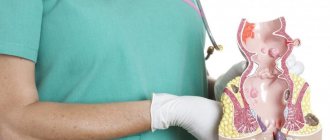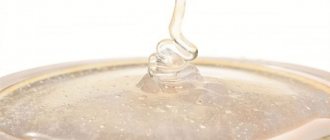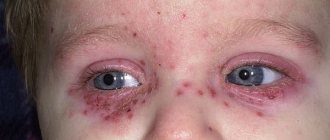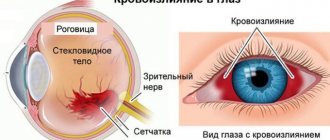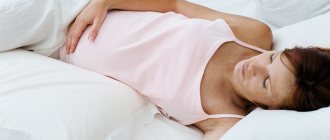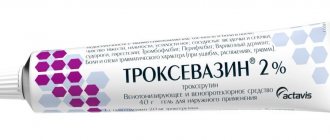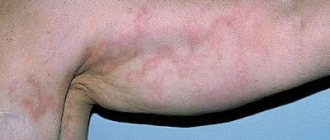Home » Hemorrhoids » Hemorrhoids in women - signs, causes and symptoms » Hemorrhoids after childbirth: treatment
Sign up for a consultation with a proctologist for the treatment of hemorrhoids for 3,500 rubles and receive a treatment prescription within 30 minutes for 1 appointment
Find out what day you need to make an appointment to get a consultation without a queue.
Experience 44 years 73 operations per month 876 operations per year 171 reviews Author of 73 scientific papers Has 9 patents 6,818 requests per month
Call
Almost every second woman develops hemorrhoids after childbirth. When pushing, intra-abdominal pressure increases, anal fissures appear, and bleeding from the anus opens. As a rule, proctological disease appears in women who have given birth naturally.
This proctological disease can be acute or chronic. You should not delay visiting a doctor or self-medicate, as the disease may worsen and lead to negative consequences.
Hemorrhoids: symptoms in women after childbirth
In the early stages, postpartum hemorrhoids are asymptomatic. The woman does not feel pain or discomfort and leads her usual lifestyle. However, hemorrhoids develop rapidly, the nodes increase in size. The following symptoms of proctological disease in women are distinguished:
- inflammation of hemorrhoids;
The size of hemorrhoids increases after labor. They become inflamed, swollen, and take on a bluish tint. The pain intensifies during the act of defecation. With chronic hemorrhoids, pain is constantly present and does not disappear even after taking medications.
- pain syndrome;
A woman feels severe nagging pain in the anus while moving. The pain also intensifies when coughing or sneezing.
- elevated temperature;
In most cases, hemorrhoids are accompanied by an inflammatory process of the mucous membrane, so the woman’s temperature rises to 37.5 degrees.
- bleeding from the anus;
In the early stages, bleeding is rare. The blood comes out by drip. In critical cases, the bleeding does not stop at all and is a stream.
- problems with bowel movements;
Constipation and gastrointestinal disorders are the most popular symptoms that worry a patient after childbirth. Flatulence is observed after eating, colicky pain in the intestines and bloating appear. Impurities of blood, pus, and mucus appear in the stool. This symptom indicates the development of an infection and requires immediate attention from a medical professional.
- lack of appetite;
With hemorrhoids, women often have a lack of appetite, nausea and vomiting for no apparent reason. Accordingly, the patient rapidly loses weight, becomes exhausted, tired and inactive.
- prolapse of hemorrhoids;
As the size of hemorrhoids grows, they begin to fall out of the anus. In the first and second stages, the lumps can be returned back to the anus. However, in advanced cases, you cannot do without the help of a specialist.
- itching and burning in the anus;
The patient is concerned about itching and burning in the anus, which usually appear in the presence of infection. Symptoms intensify with movement and interfere with the usual way of life.
If any symptom appears, you should immediately make an appointment with a proctologist. The disease progresses and affects internal organs.
Features of the chronic stage
Getting rid of chronic pathology is much more difficult; sometimes a specialist may resort to surgery. This inflammation is characterized by exacerbation and remission. An exacerbation phase may occur in a woman in the following cases:
- stressful situations (this often happens to young mothers);
- constipation (some women are afraid of defecation due to its painful sensations with this disease);
- poor nutrition;
- sedentary time (during childbirth, genital ruptures are possible, which is why patients are forced to spend most of their time in a supine position).
Treatment depends on the stage of the pathology. So, at the first stage the patient practically does not feel any discomfort. Exacerbations begin, and the patient may complain of a feeling of itching in the anus, bloody discharge that comes out along with the feces. It is at this stage that effective drug treatment must be prescribed in order to avoid surgery.
At the second stage, unpleasant phenomena begin to progress. The patient experiences pain in a sitting position, as well as sharp painful sensations during bowel movements. In the final stages, periodic bleeding occurs, even not associated with bowel movements. Treatment in this case consists of complex drug treatment and surgery, since other methods are sometimes ineffective.
Reasons for the development of hemorrhoids in pregnant women and after childbirth
The appearance of hemorrhoids is explained by some reasons that could lead to pathology. Among them:
| Intensive fetal growth | 1. During pregnancy, the work of all internal organs is disrupted, as the fetus is constantly growing and strong pressure is generated. |
| Changes in the hormonal levels of a pregnant woman | 1. From the first trimester of pregnancy, a woman’s hormonal levels change. There is an excessive release of the hormone progesterone. Progesterone impairs the elasticity of blood vessels and negatively affects blood flow in the veins. 2. In the third trimester of pregnancy, the level of the hormone relaxin increases. The cervix relaxes immediately before childbirth, and the elasticity and firmness of the vascular walls decreases. A woman’s body weight increases, which contributes to the appearance of hemorrhoids. Blood cannot circulate normally, which causes blood clots to form. |
| Labor activity | 1. During pushing and natural childbirth, the vessels of the rectum are deformed. The outflow of blood from the cavernous veins worsens. The cavernous plexuses fill with excessive amounts of blood. 2. Often hemorrhoids fall out of the anus during labor. |
| Poor nutrition | 1. The cause of the development of hemorrhoids during pregnancy can be a disrupted diet. The lack of vitamins and minerals and foods containing fiber leads to slower intestinal motility. 2. Constipation and other gastrointestinal disorders are provoked. Feces stagnate in the intestines, which increases the pressure of the vascular walls. Hemorrhoids are damaged during the act of defecation. |
| Excessive exercise | 1. Intense physical activity is extremely dangerous during pregnancy. They can not only lead to the threat of miscarriage, but also negatively affect the functioning of the esophagus. Intra-abdominal pressure rapidly increases, which affects blood flow in the pelvic vessels. |
| Overweight woman | 1. During pregnancy and after childbirth, women gain weight in most cases. This process is explained by the fact that there is excessive secretion of prolactin, or, in other words, hypothalamic syndrome. It develops due to labor pushing with the help of oxytocin. Obesity is the main reason why hemorrhoids and other proctological diseases develop. 2. Hemorrhoidal vessels are overloaded due to excessive body weight. The volume of circulating blood increases. |
| Women's sedentary lifestyle | 1. An inactive lifestyle during pregnancy is extremely dangerous. As a rule, the attending physician always advises the patient to spend more time outdoors. In addition, the time spent should be active. However, not everyone follows the doctor's recommendations. 2. With a sedentary lifestyle, intra-abdominal pressure increases, anal fissures appear, acute hemorrhoids progress, which enters the chronic stage. |
Reduced immunity can also affect the development of hemorrhoids. During pregnancy, a woman’s body is overloaded, so it’s worth consuming more vitamins and minerals.
Diagnosis of postpartum hemorrhoids
Before deciding how to treat postpartum hemorrhoids for a nursing mother
, the proctologist conducts diagnostic studies aimed at identifying the characteristics of their development. The process involves:
- Palpation, which reveals changes in relief and the presence of formations with a wide stalk and a smooth surface;
- Anoscopy, which reveals existing disorders and allows one to determine their diameter, structure and location;
- Sigmoidoscopy, supplementing the information obtained during anoscopy and clarifying the diagnosis;
- General blood analysis.
Hemorrhoids must be differentiated from anal fissures, polyps, and rectal neoplasms of malignant etiology.
Hemorrhoids after childbirth: how to treat
Most patients are interested in how to treat hemorrhoids after childbirth for a nursing mother. Of course, the treatment method is individual for each patient. Treatment depends on the condition, the size of the hemorrhoids, and the presence of concomitant diseases.
Treatment of hemorrhoids after childbirth, treatment during breastfeeding should be gentle and as safe as possible, so as not to harm the health of the newborn and the woman herself. To cure proctological pathology as soon as possible, it is worth starting therapy when the first symptoms appear. Only then will the risk of complications be reduced to zero, and the pain will disappear in a matter of days.
Treatment is carried out in three ways. Among them:
- conservative treatment;
- minimally invasive treatment;
- surgical intervention.
In most cases, hemorrhoids after childbirth are treated with medications so as not to harm the baby. This method is effective and non-traumatic. Hemorrhoidal cones are removed only if necessary in advanced stages, when the nodes begin to fall out of the anus after each act of defecation. They use drugs of both local and systemic action.
Diet for hemorrhoids
Women diagnosed with postpartum hemorrhoids should exclude smoked foods, spices, flour and sweet products, as well as peppery and fatty foods from their diet during therapy. White bread should be replaced with other types of bread.
After hemorrhoids are cured, it is important to maintain a balanced and nutritious diet. In this case, you need to eat foods that improve digestion and enhance intestinal motility (fermented milk porridge, dishes rich in plant fiber, buckwheat and rice cereals, vegetable oils). This will ensure regular bowel movements.
The peculiarity of dietary nutrition for postpartum hemorrhoids is that the quality of breast milk should not deteriorate. Therefore, nursing mothers are recommended to eat apples, bananas, dried fruits and other fruits rich in saturated microelements and fiber. You also need fish and lean meat.
You should also control the amount of fluid consumed (at least 1.5 liters per day). It is recommended to abstain from tonic and carbonated drinks.
Treatment with ointments and suppositories
When treating hemorrhoids, ointments and suppositories are often used, which act directly on the source of the disease and eliminate the cause of inflammation.
- Troxevasin;
Nursing mothers who suffer from external hemorrhoids are prescribed this drug. This ointment is made on the basis of Troxerutin, a natural rutin. The drug has a positive effect on blood circulation in the vessels of the anus, normalizes intra-abdominal pressure, and makes the vessels more resistant and strong. In addition, the risk of thrombosis and other complications is reduced. The size of the buds decreases with regular use.
- Heparin-based drugs;
Pregnant and lactating women are also prescribed Heparin ointment. This drug helps thin the blood and increase blood flow in the cavernous plexuses. The blood vessels are strengthened, the formation of blood clots is prevented, swelling and inflammation disappear. The risk of relapse is reduced to zero.
- Bezornil;
To get rid of pain and itching in the anus, women are prescribed a drug called Bezornil. This ointment consists of natural ingredients that are safe even during the lactation period. The drug has an analgesic and anti-inflammatory effect, kills harmful bacteria.
- Vishnevsky ointment;
The ointment, which consists of birch tar, castor oil and xeroform, also has an antiseptic effect.
- Posterisan;
It is an effective and safe drug during the lactation period. Produced in the form of rectal suppositories and gel. Effective for both external and internal hemorrhoids. Using Posterizan you can treat damaged areas. To relieve inflammation, pregnant and lactating women are prescribed suppositories based on sea buckthorn oil. Itching and burning in the anus are eliminated, dead soft tissue is regenerated.
Before starting a course of treatment, you should consult with your doctor.
Forecast and prevention of postpartum hemorrhoids
If diagnosis and treatment were carried out in a timely manner, hemorrhoid treatment will be successful. A properly performed operation will allow you to completely get rid of it. Prevention requires proper nutrition, water consumption and sufficient physical activity.
The Doctor Nearby network of clinics invites you to undergo diagnostics and treatment for postpartum hemorrhoids in Moscow. We have a powerful diagnostic base that allows us to correctly identify the existing problem and find effective ways to eliminate it. Our staff is staffed by highly qualified doctors with many years of practical experience. They will individually develop treatment tactics and achieve complete recovery! Make an appointment with them by filling out and submitting the form online or by calling us!
Drug therapy
In the initial stages of hemorrhoids, women are prescribed Troxevasin in tablet form. The drug does not have a negative effect on the baby’s health; the components of the drug practically do not pass into breast milk.
During the lactation period, homeopathic medicines are also prescribed for the treatment of proctological diseases. Hemorrhoids are treated with venotonic drugs. Among them are Venza, Venoruton and others. If bleeding from the anus is profuse, then Ascorutin, which contains vitamin C, is effective.
To normalize intestinal function and improve microflora, you should take laxatives. This group of medications softens stool and prevents stool from stagnating in the intestines. Defecation will not be so painful, the hemorrhage will disappear.
Why is there a problem?
Hemorrhoids in a nursing mother are a common problem. Often the disease develops during pregnancy, especially in its last stages. This is due to the growth of the uterus, which puts pressure on the walls of the rectum. Before the baby is born, symptoms may be absent or mild. The pathology worsens during the birth process, when intra-abdominal pressure increases significantly. The consequence of this process is the formation of nodes and anal fissures, which entails many unpleasant symptoms of the disease.
Another common cause of hemorrhoids in nursing mothers is constipation. Abnormal bowel movements occur due to many reasons. This is diet, stress, an increase in the hormone progesterone. As a result, the digestion process is disrupted, constipation appears, leading to hemorrhoids.
In addition, the following conditions may be factors that provoke the disease:
- low physical activity;
- taking hormonal medications prescribed by a doctor;
- stress, chronic fatigue;
- long labor (more than 12 hours).
Hemorrhoids during breastfeeding can appear as an exacerbation of an existing disease before pregnancy and childbirth. To prevent complications of the disease, you should promptly recognize the symptoms of hemorrhoids and take the necessary measures to treat it.
Surgery and minimally invasive procedures
In the third and fourth stages of hemorrhoids, surgery and minimally invasive procedures are used, since medications are ineffective. When breastfeeding, gentle procedures are carried out that relieve the woman of hemorrhoids and at the same time do not harm the baby.
One of the most popular treatment methods is called cryotherapy. Hemorrhoidal neoplasms are treated with liquid nitrogen. Necrosis of soft tissue occurs under the influence of low temperatures. After a few days, the tumors disappear.
An effective way to treat pathology is latex ligation using rings. During the procedure, a surgical instrument, a ligator, is used. A latex ring is placed at the base of the hemorrhoid. Blood does not enter the node, necrosis occurs, the node dies and disappears.
The procedures are carried out in the private proctology center “Proctologist 81”.
The reasons for this phenomenon
Before prescribing treatment, it is necessary to find out the causes of this pathology. Some believe that hemorrhoids occur due to childbirth itself. However, it is not. Inflammation of hemorrhoidal nodes is a chronic disease that can be aggravated under the influence of certain factors. Hemorrhoids after childbirth can occur during the period of pushing, when the woman’s nodes fall out.
The main reason for the exacerbation in this case is overstrain of the perineal muscles, as a result of which the blood vessels begin to be compressed. After giving birth, a woman faces the question: how to cure this unpleasant phenomenon, preferably without surgery, and how to prevent relapses?
Traditional methods of treating hemorrhoids
Traditional methods of treatment are popular. To relieve swelling and pain in a short time, use potato suppositories. This product is known for its anti-inflammatory properties. The potatoes are washed and peeled. Suppositories are cut into small lengths and inserted into the anus after bowel movement.
To stop the inflammatory process and get rid of itching and burning, it is recommended to make baths with medicinal herbs. For this, chamomile flowers, yarrow grass, walnut branches and other components are used. The ingredients are poured with two liters of warm water. The broth is infused, after which it is filtered. The anus area is immersed in warm liquid. When the temperature decreases, the procedure should be completed.
An alternative to yarrow is hop cones, which also have anti-inflammatory properties. For hemorrhoids, dogwood berries are used, which relieve swelling and have an antibacterial effect. Dogwood berries are taken orally before each meal.
